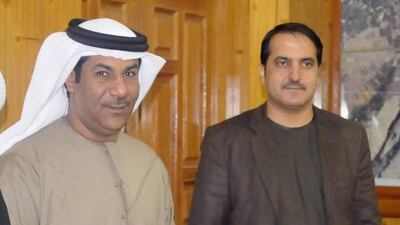KABUL // A member of the Kandahar governor's staff – likely a cook – smuggled explosives hidden in food into a meeting with Emirati diplomats that killed 13 people, including the UAE ambassador, the governor told The National.
Hamayoun Azizi was severely injured when the two bombs exploded around three minutes apart inside his residence in January, he said. His account of the attack differs from previous reports, which had the bombs placed in a sofa in the palace meeting room.
“The explosive materials were hidden in the meal, fruits and dishes which entered to the hall for the guest to be served,” Dr Azizi said. “Both blasts were inside on the table.”
The governor, who recently returned to his job after months of medical treatment in India and France for the severe burns he suffered, blamed Kandahar’s police and security personnel for their failure to detect the hidden bombs, especially as they usually searched deliveries of food coming into the residence.
“I accept that men were inside among us who prepared the ground for this attack,” Dr Azizi said. “Without their help, it was not possible.”
Afghan officials with Emirati, British and American assistance, have yet to publish the conclusions of an investigation into the attack, which killed Juma Al Kaabi, the UAE ambassador to Afghanistan, and five other Emirati aid workers.
But the The New York Times reported last week that a palace cook has been arrested and is suspected of working for the Taliban in the plot which targeted the Kandahari officials. They included the notorious police chief General Abdul Raziq, the most powerful figure in the province and a sworn enemy of the insurgents.
Kandahar province has remained under the control of the provincial power brokers who have been able to fend off the Taliban at a time when the insurgents have successfully pushed an offensive across the country.
The Taliban have denied any involvement in the attack on the governor's residence, telling the The New York Times that they would not target the UAE.
Kandahar, which is largely outside the control of the central government in Kabul, is ruled by overlapping tribal elites, criminal networks, warlords and provincial officials as well as militants, who control large patronage networks and often resort to violence in their competition over the drugs trade and the cross border economy with Pakistan.
“Elites collude when mutually beneficial but they are also fiercely – and, often, violently – competitive,” wrote analyst Ashley Jackson in a 2015 research paper for the UK-based Overseas Development Institute.
“This violent competition by ostensibly pro-government actors, with political assassinations often confused for or understood as Taliban violence, fed the rampant insecurity” in the province.
Gen Raziq, who has been accused of routine human rights abuses against Taliban suspects and rivals during his nearly decade-long tenure, is the most powerful figure in the province. As a leader of the supposedly pro-Kabul Achakzai tribe, he has undermined the rival Noorzai tribe and cut off access to many networks that provide jobs and services.
While observers say Gen Raziq has more recently opened the patronage system to more Kandaharis to try and limit the appeal of the Taliban, Dr Azizi since being appointed in 2015 has promised to reform the patronage system, putting him at odds with his police chief.
Some suspicion has fallen on Gen Raziq because he stepped out of the January 10 meeting three minutes before the first bomb was detonated, Dr Azizi said. According to a Pakistani official who spoke to The National and a report by Pakistan's Express Tribune newspaper, Emirati officials were angered by Gen Raziq's refusal to submit to questioning by investigators.
“If some say he is involved, I don’t have evidence and awareness because I was out for treatment and not involved in the investigation,” Dr Azizi said.
The 41-year-old father of three is still grappling with the physical and psychological trauma of the terrorist attack. He himself is a surgeon specialising in burns.
“I remember the guests were relaxed, we were happy, but immediately I heard a very big sound of explosion, it made the hall dark, and smoke filled the hall,” Dr Azizi said. “I didn’t hear any voice of shouting or sound of help from people in the hall, it was quiet silence.”
With his face and hands burned and shrapnel in his legs, Dr Azizi said he staggered to a nearby bathroom to put water on his injuries and then went to find guards to help the wounded.
“Less than three minutes later another big explosion happened and it made a huge destruction,” he said.
There were no ambulances so he was driven in his own car to the Kandahar hospital, where there were no burn specialists, before being taken to the American military hospital. He fell unconscious soon after for six days.
Dr Azizi will have to undergo further surgery on his leg, but for now is able to carry out his duties. He has moved his family to Kabul, and said his children are also traumatised and fearful.
“Psychologically I am not well,” he said. “I remember the hall, the blast, the smoke. My friends and colleagues [who died] are always on my mind.”
tkhan@thenational.ae
* Taimur Khan reported from Abu Dhabi

